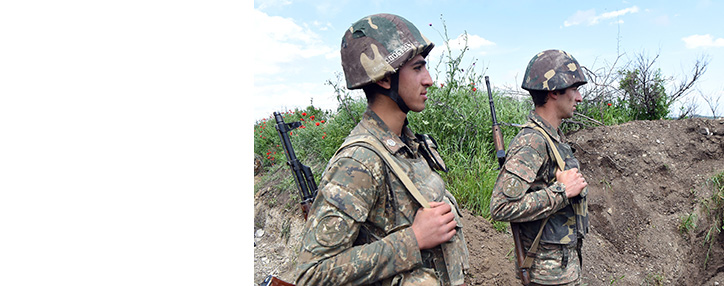Armenian defense minister says all-out war in Karabakh is unlikely
28.06.2017,
15:21
Armenia’s defense minister Vigen Sargsyan said today an all-out war in the Nagorno-Karabakh conflict zone is unlikely.

YEREVAN, June 28. /ARKA/. Armenia’s defense minister Vigen Sargsyan said today an all-out war in the Nagorno-Karabakh conflict zone is unlikely.
"I am almost sure that an all-out war can not begin for the simple reason that to solve the Karabakh problem this way is simply impossible. Under no scenario of military actions the Karabakh conflict can be resolved in favor of Azerbaijan," Sargsyan told journalists on Wednesday. He said that in the case of a large-scale war, the risk of irreparable damage to the Azerbaijani economy is very high.
"I do not minimize the threats that a large-scale war can cause to Armenia, but unleashing deliberately a large-scale war in this situation would be madness for the Azerbaijani leadership," the minister added. However, according to him, this does not rule out various provocations and escalation of tension on the border by Azerbaijan. "We must always be ready for this, there is no alternative for us, I think our entire society knows this," Sargsyan said.
The Nagorno-Karabakh conflict erupted into armed clashes after the collapse of the Soviet Union in the early 1990s as the predominantly Armenian-populated enclave of Azerbaijan sought to secede from Azerbaijan and declared its independence backed by a successful referendum.
On May 12, 1994, the Bishkek cease-fire agreement put an end to the military operations. A truce was brokered by Russia in 1994, although no permanent peace agreement has been signed. Since then, Nagorno-Karabakh and several adjacent regions have been under the control of Armenian forces of Karabakh.
Nagorno-Karabakh is the longest-running post-Soviet era conflict and has continued to simmer despite the relative peace of the past two decades, with snipers causing tens of deaths a year.
On April 2, 2016, Azerbaijan launched military assaults along the entire perimeter of its contact line with Nagorno-Karabakh. Four days later a cease-fire was reached. ---0---
"I am almost sure that an all-out war can not begin for the simple reason that to solve the Karabakh problem this way is simply impossible. Under no scenario of military actions the Karabakh conflict can be resolved in favor of Azerbaijan," Sargsyan told journalists on Wednesday. He said that in the case of a large-scale war, the risk of irreparable damage to the Azerbaijani economy is very high.
"I do not minimize the threats that a large-scale war can cause to Armenia, but unleashing deliberately a large-scale war in this situation would be madness for the Azerbaijani leadership," the minister added. However, according to him, this does not rule out various provocations and escalation of tension on the border by Azerbaijan. "We must always be ready for this, there is no alternative for us, I think our entire society knows this," Sargsyan said.
The Nagorno-Karabakh conflict erupted into armed clashes after the collapse of the Soviet Union in the early 1990s as the predominantly Armenian-populated enclave of Azerbaijan sought to secede from Azerbaijan and declared its independence backed by a successful referendum.
On May 12, 1994, the Bishkek cease-fire agreement put an end to the military operations. A truce was brokered by Russia in 1994, although no permanent peace agreement has been signed. Since then, Nagorno-Karabakh and several adjacent regions have been under the control of Armenian forces of Karabakh.
Nagorno-Karabakh is the longest-running post-Soviet era conflict and has continued to simmer despite the relative peace of the past two decades, with snipers causing tens of deaths a year.
On April 2, 2016, Azerbaijan launched military assaults along the entire perimeter of its contact line with Nagorno-Karabakh. Four days later a cease-fire was reached. ---0---



